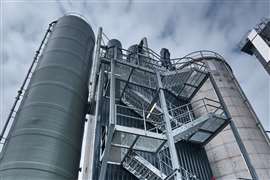EU construction output fell in September
19 November 2010
Construction output fell -2,1% in the Euro Area from August to September, according to figures from Eurostat, the statistical office of the European Union.
And year-on-year falls were more pronounced. Set against September 2009, this year's output dropped by -8,1% in the Euro Area and by -3,6% in 27 countries which make up the EU.
Among the member states for which data are available for September 2010, Eurostat said month-on-month construction output fell in nine, rose in four and remained stable in the Czech Republic.
At +4%, the highest increase was reported in Romania, followed a +2,9% increase in Poland and a +1,4% increase in Sweden.
Offsetting this were large declines in Slovenia, where construction output fell -8,3%, Slovakia which registered a -7,6% drop and Portugal, with a -4,6% fall.
And according to Eurostat's annual calculations, the largest decrease was registered in Spain, where production fell -37,3% year-on-year, while Slovenia saw a -18,5% annual fall.
The highest year-on-year increases were recorded in Poland, where output grew +13,4%, Sweden and the UK, which both grew +6,9% each.
Eurostat's statistics were released on the same day (17 November) that the European Construction Forum (ECF) urged EU member states not to slash construction investment in upcoming austerity measures throughout the European economic area.
At an event in the European Parliament, the ECF - which represents key players in the construction sector - stressed the "essential role of construction in ensuring a prosperous future for Europe".
Speaking on behalf of ECF members, president of the Architect's Council of Europe Selma Harrington highlighted that the construction sector represents around 10% of the EU's GDP and over 7% of employment.
"The sector plays a crucial role in the European economy, contributing to renewed growth and employment after the terrible downturn that has affected the entire continent," Ms Harrington said, stressing that a regulatory framework which insures "a level playing field globally" is essential.
Given the opportunity, resources and regulatory framework, the construction sector will be a "significant contributor to the establishment of sustainable development in the European Union," Ms Harrington explained.
In May this year, the European Parliament adopted the final text of the recast of the Energy Performance of Buildings Directive, concluding the final legislative step for a central piece of EU legislation which will affect the construction sector going forwards.
The directive focuses on energy consumption and greenhouse gas emissions from buildings.
Member of the European parliament Fiona Hall said policy-makers at European Level were clear that "work on improving the energy efficiency of the existing building stock in Europe is key to accelerating economic recovery as well as an essential element of any strategy to reduce the greenhouse gas emissions of the EU significantly".
The EU needs at least to triple its current rate of building renovation in order to come close to achieving these aims, Ms Hall concluded.




